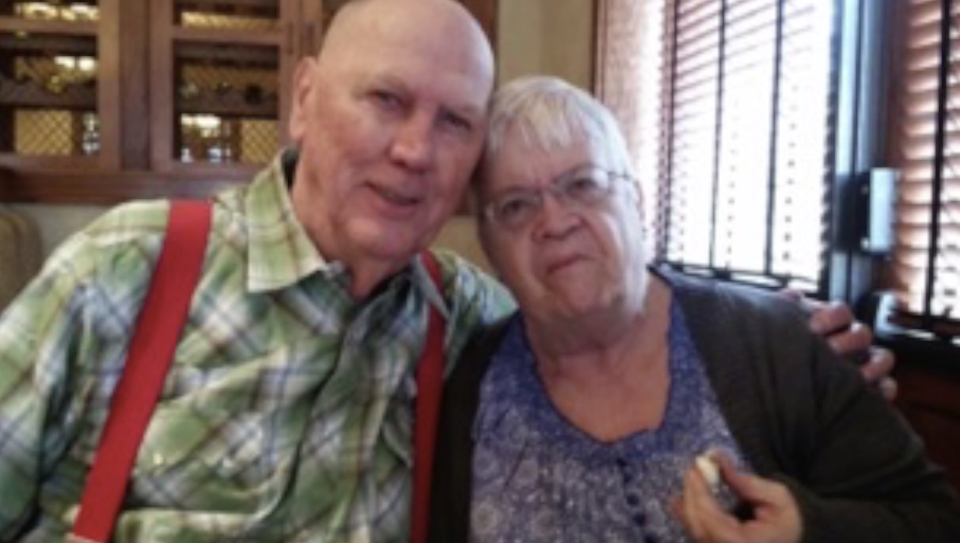Man hospitalized with COVID-19 shares regret after wife’s death: ‘I wish I would’ve taken it more seriously’
A hospitalized man fighting COVID-19 is also grieving his late wife, wishing he had taken more pandemic precautions.
David Long of Harrison, Mo., spoke to local news station Fox 4 Kansas City via telephone, from Research Medical Center in Kansas City, where he is being treated for COVID-19. David was initially hospitalized in November after developing COVID-19 symptoms and returned home after two weeks. However, several days later, both him and Paula Long, his wife of 38 years, were admitted.

He told the station that Paula experienced “severe” COVID-19 symptoms and died on Dec. 1. “I miss her so much. If you love your loved ones, take care of them,” he told the outlet, admitting he had been cavalier about the coronavirus. “I wish I would’ve taken it more seriously and had not gone to places like bars, restaurants and such without protection,” he said.
“Sweetest thing I had ever known is loving her,” said David. A spokesperson from Research Medical Center did not immediately reply to Yahoo Life’s request for comment.
During a year of spiking COVID-19 cases, stop-start state re-openings, pandemic politics, school closures, mental health concerns and medical misinformation, many have lowered their guard, resulting in “pandemic fatigue.” The loose term applies to circumstances in which people feel frustrated, exhausted or numb to the demands of the pandemic and relax their health habits.
Related: How to fight COVID fatigue during the holidays
In June, one month before he died of COVID-19, a Lake Elsinore, Calif. man named Thomas Macias, 51, referred to his “stupidity” for attending a local BBQ. His brother-in-law told CNN that Macias had “barely” left his house prior to the gathering but gave in to feelings of isolation when his state lifted some gathering rules. Someone had attended the BBQ aware of their COVID-19 status, but mistakenly believed he was not infectious. According to the Centers for Disease Control and Prevention, asymptomatic or pre-symptomatic cases drive an estimated 50 percent of transmissions.
And in August, a Texas man named Tony Green who believed COVID-19 was a “rebranded flu” reconsidered after 14 family members fell ill with the virus after a summer gathering. He pointed to a breakdown in communication at the White House for partially shaping his views. “I believed the mainstream media and the Democrats were using [COVID-19] to create panic, crash the economy and destroy Trump’s chances at reelection,” he told ABC News.
In the U.S., the coronavirus pandemic has caused 15 million positive cases and more than 280,000 deaths with Dr. Anthony Fauci, the director of the National Institute of Allergy and Infectious Diseases warning on Monday that the “full brunt” of Thanksgiving celebrations (positive cases and hospitalizations) has yet to be realized, predicting that January "could be a really dark time for us."
Many healthcare workers have absorbed the blow. “We can only tell people it’s real so many times. We’ll have patients come up positive and they’ll say, ‘You're just trying to take our money’ or ‘You didn't do it correctly,” Karina Molina an ER nurse in Kentucky, previously told Yahoo Life. “People have said, ‘No, I’m not going up to the COVID unit. I don't have it.’ How do you argue that? How much more real can it get?”
Neda Gould, an assistant professor of psychiatry and behavioral sciences at Johns Hopkins, tells Yahoo Life that regret is one of the most complicated emotions, especially when death is involved. “There is a finality with death — you can’t go back and apologize or fix a mistake, unlike in other circumstances where there’s opportunity to self-correct,” she tells Yahoo Life. “Guilt can eat away at a person but part of the healing process is turning toward it and acknowledging it.”
“It’s remarkable when people are resilient — it’s a gift we can all learn with practice,” she adds. “It’s a question of, ‘Can I grow and learn from this?’”
For the latest coronavirus news and updates, follow along at https://news.yahoo.com/coronavirus. According to experts, people over 60 and those who are immunocompromised continue to be the most at risk. If you have questions, please reference the CDC’s and WHO’s resource guides.
How to maintain your physical and mental health during the pandemic
Taking care of a loved one with COVID-19? Here’s how to stay healthy
Q&A with Dr. Kavita Patel: How to keep your family safe and maintain your mental health
Read more from Yahoo Life:
Viral photo of iPads used for virtual end-of-life visits prompts latest sobering reality of COVID-19
Want lifestyle and wellness news delivered to your inbox? Sign up here for Yahoo Life’s newsletter.
